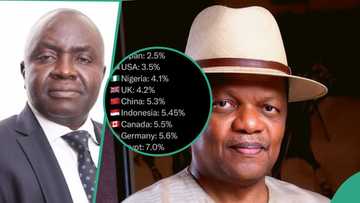KPMG Reverses Nigeria’s Economic Growth Forecast for 2023, Gives Reasons
- Klynveld Peat Marwick Goerdeler (KPMG) has released a new forecast on Nigeria's economic growth in 2023
- According to respected financial institutions, Nigerians should expect growth slower compared to its earlier forecast
- Its predictions are based on inflation, high debt to service, oil production, and the continuing struggle of the naira.
PAY ATTENTION: Click “See First” under the “Following” tab to see Legit.ng News on your Facebook News Feed!
Global financial service firm, KPMG has announced a new forecast for the Nigerian economy in 2023.
In a flashnote titled ‘Underwhelming Q2 2023 GDP Growth Recorded’, KPMG adjusted its growth forecast to 2.65 percent – down from 2.85 percent earlier projected.

Source: Getty Images
Why the change in KPMG forecast
Details from the report shows that KPMG listed the factors for the downward projection to low oil production, muted government investment in the economy, the impact of subsidy removal and foreign exchange (FX) rates unification on households, among others.

Read also
“It’s a joke”: Experts speak as Nigeria’s unemployment rate becomes 3rd best globally, beats France, UK
PAY ATTENTION: Share your outstanding story with our editors! Please reach us through info@corp.legit.ng!
Legit.ng had earlier reported Gross Domestic Product growth of 2.51% (year-on-year) in real terms in the second quarter of 2023.
KPMG agreed in its report and stated:
“Q2 2023 GDP results is broadly in line with our earlier downward revision of 2023 GDP to 2.85%.
"Nevertheless, we are adjusting our 2023 forecast further downwards to 2.65%.
“Firstly, half year 2023 GDP currently stands at 2.41% and will require an average growth in H2 2023 of 3.30% and 3.50% to end the year at 2.85% and 3.0% respectively for 2023 which we believe is challenging and unlikely.
“Q2 2023 is however the quarter where the impact of Subsidy removal, FX unification and other reforms of the new administration had it major impact on squeezing household consumption demand and firms’ costs of operations as well as reduced private investment as firms continued to adopt a wait and see approach, tweak strategies to cope with rising costs and reduced demand for their goods and services and struggled to find FX to operate.

Read also
"I don't know whether to laugh or cry": Billionaire Atedo Peterside reacts to Nigeria's 4.1% unemployment rate
"These factors will likely constrain non-oil growth given that household consumption and private investment constitute the largest share of GDP.
KPMG also said it expected further increases in inflation for the rest of 2023, which would make the pressure on nominal to real gross domestic product (GDP) higher, curtailing higher real GDP growth in Q3 2023.
Nigeria's oil savings account now in thousands
In another report showing how Nigeria's economy stretched, Legit.ng reported that Nigeria's oil savings have depleted.
ECA is a savings account retained by the Federal Government and is funded by crude oil sales higher than the budgeted oil price benchmark.
The report shows that the federal government has been unable to add a dollar to the account but has made consistent withdrawals.
Source: Legit.ng


